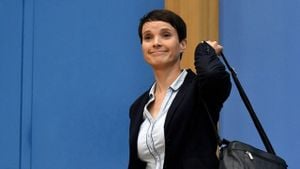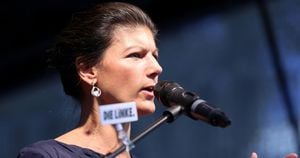The political scene in Germany is heating up as the nation prepares for early federal elections on February 23, 2025. This unexpected turn of events follows the collapse of the Ampel coalition government, which brought together the Social Democrats (SPD), the Greens, and the Free Democrats (FDP). Now, approximately 59 million eligible voters, including 2.3 million who will cast their ballots for the first time, will participate in this pivotal election.
With the Bundestag elections originally slated for September 2025, the current timeline marks a significant shift prompted by political turbulence within the ruling coalition. Chancellor Olaf Scholz (SPD) dismissed Finance Minister Christian Lindner (FDP) in November 2024, which eventually led to the breakdown of the triad coalition. Scholz's decision to pose the question of confidence and his subsequent loss triggered the dissolution of the Bundestag by President Frank-Walter Steinmeier, clearing the way for new elections.
Voters will utilize a dual-voting system, casting their first vote, or Erststimme, for a candidate within their local constituency, and their second vote, or Zweitstimme, for their preferred party. This personalized proportional representation system means candidates win seats based on local support, but party representation is determined by total party votes. The five-percent threshold, which limits representation to parties achieving at least five percent of the Zweitstimme, adds another layer of complexity to this electoral process.
The current political climate indicates uncertain outcomes. Polls show the CDU/CSU alliance leading the pack with around 28 to 31 percent support, closely followed by the AfD (Alternative for Germany) polling between 20 and 21 percent, whilst the SPD's support is faltering at approximately 15 to 16 percent. Meanwhile, the Greens are expected to garner 13 to 14 percent, potentially indicating the need for coalition agreements to form a government, as clear majority options for two-party coalitions appear slim.
Despite the serious stakes involved, there are unique challenges surrounding the election. A total of 29 parties are vying for representation, significantly fewer than the 47 parties seen during the previous election period, which emphasizes the increasing polarization and fragmentation of German politics. Some smaller parties, particularly the FDP, may struggle to surpass the five-percent threshold based on current polling trends. Lindner's statement captures the essence of this election's significance: “I am responsible for the fact there will be new elections,” highlighting the pivotal role he played leading up to this political recalibration.
The changes to electoral reforms also play a major role. The new laws aim to limit the Bundestag's size to 630 members as opposed to the former 733, addressing issues of political efficiency and representation. The reform has aimed to streamline the election process and mitigate the complications arising from overhang and compensatory seats awarded during previous elections.
The elections are anticipated to be characterized by notable voter engagement, with initial reports indicating higher turnout compared to the 2021 elections, which saw participation at 76.4 percent—the highest since 2005. Sector analyses assess the factors influencing turnout, including potential dissatisfaction with current political leadership and the urgent demand for effective governance amid economic and societal challenges.
Once the polls close at 18:00 CET on February 23, results will quickly emerge, shedding light not only on party standings but also on possible coalition negotiations. Political experts speculate coalition talks could become prolonged due to the fragmented parliamentary representation, echoing the recent challenges faced by the outgoing Ampel coalition.
After results are tabulated, the new Bundestag's inaugural session must convene no later than 30 days following the election. New representatives will be elected, and the president will nominate candidates for the chancellorship—an influential moment considering the significant power plays tied to party alliances. If this process encounters stalemate, the Bundestag may opt for alternative candidates if the absolute majority is not achieved during the initial votes.
How this electoral event might reshape the political future of Germany is uncertain, but what's clear is the forthcoming election will set the tone for governance over Europe’s largest economy well beyond 2025. Each political party will aim to ally strategically with their counterparts to secure substantial control and influence within Parliament, driving the narrative of progress and stability for the German populace.



